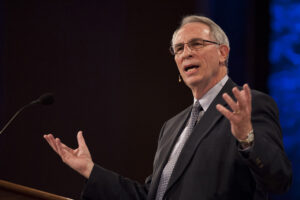
NASHVILLE (BP) — Navigating the “surprisingly emotional subject” of what to tell kids about Santa requires grace toward others and a focus on Jesus, say Southern Baptist Convention President J.D. Greear and LifeWay Christian Resources marriage and family strategist Joshua Straub.
 Greear discussed kids and Santa — which he called “a surprisingly emotional subject for a lot of people” — on the Dec. 10 episode of his podcast “Ask Me Anything.” Straub wrote about it in a Nov. 30 post on the LifeWay Voices blog.
Greear discussed kids and Santa — which he called “a surprisingly emotional subject for a lot of people” — on the Dec. 10 episode of his podcast “Ask Me Anything.” Straub wrote about it in a Nov. 30 post on the LifeWay Voices blog.
Among the principles emphasized by both: Each family must follow their own convictions without judging or disparaging believers who differ.
Greear, pastor of The Summit Church in Raleigh-Durham, N.C., said “a lot of families parse this differently…. Having parented four kids now into their teenage years, I get more willing every year, I think, to show more grace about this.”
Straub urged families to “follow your convictions” but “don’t judge others for how they carry out their own Christmas traditions (see Romans 14). Besides, there’s already enough parent shaming to go around today.”
In Greear’s family, he and his wife Veronica entertained the “fantasy” of Santa Claus when their children were young, he said, then told them the truth as they got older and asked direct questions. He acknowledged his way of handling Santa isn’t the only way godly believers can navigate the topic.
“I don’t feel comfortable telling a direct lie to my kids about anything,” Greear said. Yet “there is an appropriate and non-harmful place for fantasy in a child’s life. Because of that, I don’t mind playing kids games with my children when they’re kids.”
When Greear’s children, who now range in age from 8-15, were 5 and under, J.D. and Veronica “would talk about Santa as if he were real” with “a twinkle” in their eyes, Greear said.
When Greear’s kids would inquire directly about Santa at a young age, he would ask their opinions then “quickly change the subject,” he said. As they matured, they recognized the truth.
Entertaining the Santa fantasy, Greear said, did not compromise his ability to tell his children the truth about Jesus.
“If they can’t tell the difference between a little fantasy you play along with at a particular time of year” and “a Savior that you have devoted your life to … then I would say you might have a bigger problem than just playing along with a fantasy.”
Straub, a child psychologist who has written or coauthored four books, offered several “suggestions for handling Santa Claus as Christians,” regardless of whether families opt to play along with the fantasy. Among them:
— “Don’t use Santa Claus to manipulate your children to behave.”
“At the risk of sounding like a scrooge, Santa’s not making a list and checking it twice,” Straub wrote. “God, on the other hand, really does know your child’s heart. The values and discipline we instill in our children throughout the year ought not to be based on a fictional character, but on the God who knows even the number of hairs on our child’s head.”
— “Build relational trust with your kids.”
Citing 2016 research in the journal The Lancet, Straub warned that “vulnerable” parent-child relationships may be damaged by “involved” and “long-lasting” lies about Santa. But in “emotionally safe” homes that “place high value on the birth of Jesus” and exhibit strong parent-child relationships, what is said about Santa “isn’t the issue.”
— “Teach your kids about the real St. Nicholas.”
“The term Santa Claus is derived from the name St. Nicholas, a real and revered 4th century Christian saint, who became known for secretly giving gifts to others,” Straub wrote. “Note: He gave presents to people not based on their behavior, but to secretly bless them.”
— “Focus on Jesus’ birth.”
“No matter your personal convictions about Santa Claus, spend more time talking about Jesus’ birth than jolly ‘ole St. Nick,” Straub wrote. “… If he comes to their school or we see him in a Christmas movie, we talk about Santa, but we also use him as a way to point our kids to Jesus.”
In the end, the Straubs “put out milk and cookies the night before Christmas,” he wrote. Yet that exercise “pales in comparison to the birthday party our family holds for Jesus.”













